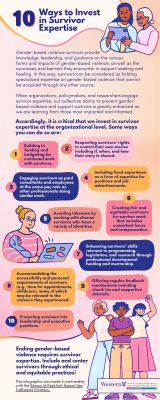Our Work
.
10 Ways to Invest in Survivor Expertise

In this infographic, we identify everyday actions and structural changes that can be adopted at the organizational level to ethically and equitably include and center survivor expertise.
This infographic was made in partnership with the Region of Peel Anti-Human Sex Trafficking Program based on their Remuneration Framework for Consultants and Staff with Lived-Experience of Human Trafficking.
May 2024
Gender-based violence survivors provide knowledge, leadership, and guidance on the various forms and impacts of gender-based violence, as well as the successes and barriers they encounter in support-seeking and healing. In this way, survivors can be considered as holding specialized expertise on gender-based violence that cannot be acquired through any other source.
When organizations, policymakers, and researchers engage survivor expertise, our collective ability to prevent gender-based violence and support survivors is greatly enhanced as we are learning from those most impacted and informed.
Accordingly, it is critical that we invest in survivor expertise at the organizational level. Some ways you can do so are:
- Building in funding and budgeting for continued work with survivors.
- Respecting survivors’ rights to control their own stories including if, when, and how their story is shared.
- Engaging survivors as paid consultants and employees at the same pay rate as other professionals doing similar work.
- Including lived experience as a form of expertise for positions and job advertisements.
- Avoiding tokenism by working with diverse survivors who have a variety of identities.
- Creating fair and equitable contracts for survivor work that includes consistent hours and compensation.
- Enhancing survivors’ skills relevant to programming, legislation, and research through professional development funding and mentorship.
- Accommodating the accessibility and personal requirements of survivors (e.g., time for appointments, childcare), many of which may be relevant to the violence they experienced.
- Offering regular feedback mechanisms including check-ins and supportive debriefs.
- Promoting survivors into leadership and executive positions.
Ending gender-based violence requires survivor expertise. Include and center survivors through ethical and equitable practices!
All our resources are open-access and can be shared (e.g., linked, downloaded and sent) or cited with credit. If you would like to adapt and/or edit, translate, or embed/upload our content on your website/training materials (e.g., Webinar video), please email us at gbvln@uwo.ca so that we can work together to do so.






